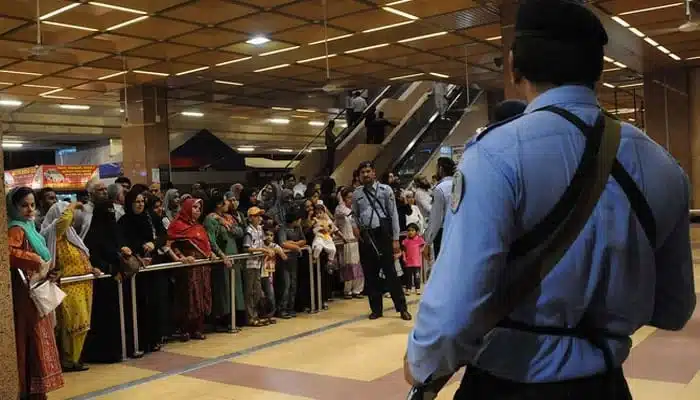Over 50 deportees arrive in Karachi as 30 denied travel abroad
Sources say most deportees came from Saudi Arabia and Iraq.
Most deportees travelled back home on emergency papers.
Sources say offloaded passengers heading to Saudi Arabia, China.
At least 51 deported Pakistanis landed in Karachi from seven countries over the last 24 hours, while 30 passengers were offloaded from international flights at the Jinnah International Airport in the port city late on Tuesday night due to issues with their travel documents and other irregularities, officials from the immigration department told Geo News.
The development comes a couple of days after at least 30 passengers set for travel to different countries were offloaded from different planes in Karachi over suspicion of human smuggling.
Among those offloaded earlier today, 11 passengers were travelling on business and visit visas to China and Malaysia, immigration sources revealed, adding that four others who were heading to Oman on family visit visas, were also barred from boarding.
Another traveller with a visit visa for Uganda also faced similar action.
Other offloaded individuals included those bound for Saudi Arabia — five on Umrah visas, two on business visas, and two on work visas while a passenger was travelling on a personal visit visa.
Immigration authorities said that these people were barred from travelling owing to inadequate advance hotel bookings, insufficient travel funds, and other procedural shortcomings.
In another development, 51 Pakistani nationals deported from seven countries, including Saudi Arabia, Iraq, the United Arab Emirates and the United Kingdom, returned to Karachi during the past 24 hours.
These Pakistanis were flown to Karachi on board different flights.
Among them, 33 deportees arrived from Saudi Arabia and 14 from Iraq, with almost all of them travelling on emergency passports except two citizens who travelled on their original documents.
Countries such as Oman, Zambia, and Qatar also deported one Pakistani each during the same period, the immigration sources said.
30 offloaded over human trafficking suspicion
Immigration officials on January 4 said that most of the 30 offloaded individuals were going to fall victim to human smuggling, adding that most of the detained individuals had been transferred to the Anti-Human Smuggling Circle for further investigation, while some people were allowed to go back home.
Officials reported that the offloaded passengers were questioned for various reasons.
Abid Ali, a passenger bound for Saudi Arabia, was flagged on the Integrated Border Management System (IBMS) list. Similarly, Salman Riaz, a public servant travelling to the Gulf on an employment visa, lacked the required no-objection certificate (NOC).
Several passengers heading to Saudi Arabia — Aftab Ahmed, Mohammad Khalil, Mohammad Riaz, and Ahmed Khan — were found to have incomplete documents. Another passenger, Faiz, holding a visit visa, lacked sufficient funds for travel expenses and hotel bookings.
Officials also suspected Umrah passengers Iqbal, Imran, Mujahid, another Imran, and Ijaz of being involved in human trafficking.
Meanwhile, a passenger travelling to Azerbaijan was offloaded on the suspicion of being linked to human smuggling operations in Europe.
Nine passengers — Fazal, Hussain, Najaf, Liaqat, Kashif, Anzal, Owais, Mohsin, and Shabbir — were also offloaded from a flight to Azerbaijan.
In another case, Oman-bound passenger Shaukat was found without sufficient funds in his bank account for travel expenses and hotel bookings. Babar Khalil and Hamza Javed, also travelling to Oman, were offloaded due to incomplete work visa documentation.
Records showed that Aminullah, another Oman-bound passenger, held two passports issued under his name.
Dubai-bound passenger Saira Bano failed to provide adequate details regarding her travel expenses, accommodation, and purpose of visit.
Furthermore, Nigerian nationals Daniel Saqib and Syed Bilal Hussain were travelling without work visas, while Tanzanian-bound passengers Sadaf Mustafa and Muhammad Ijaz lacked hotel bookings and sufficient travel funds.

